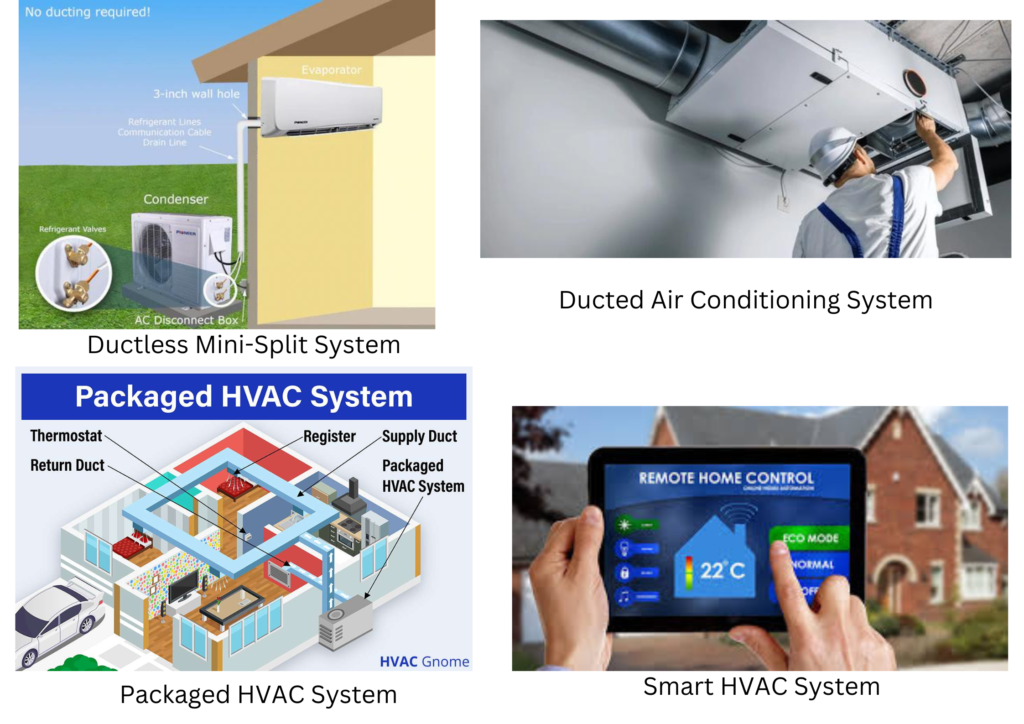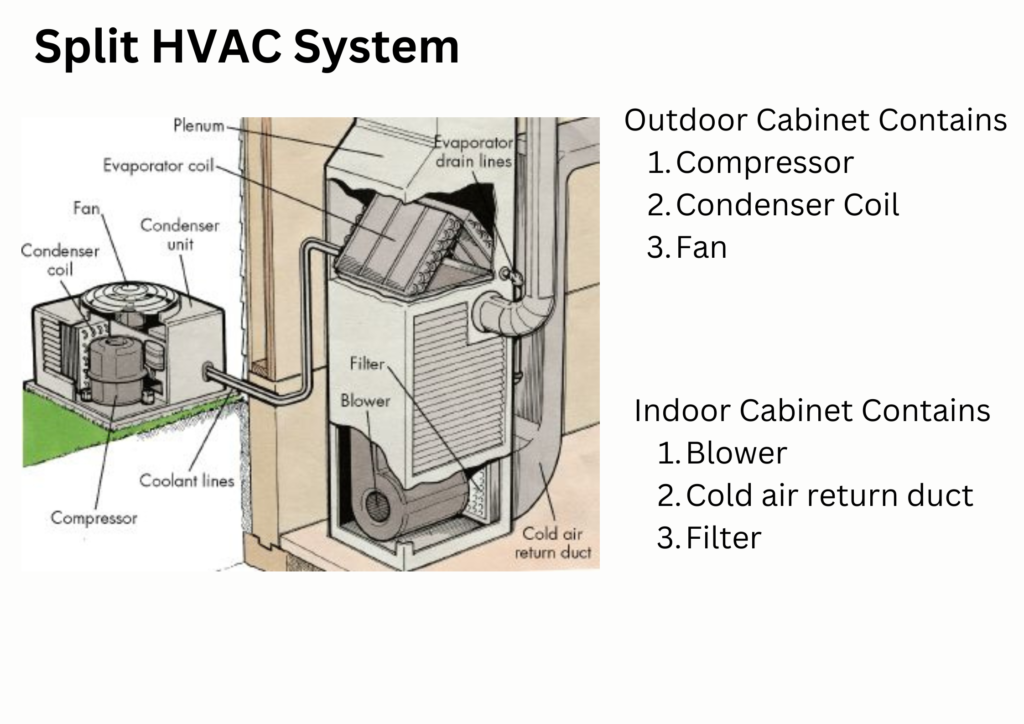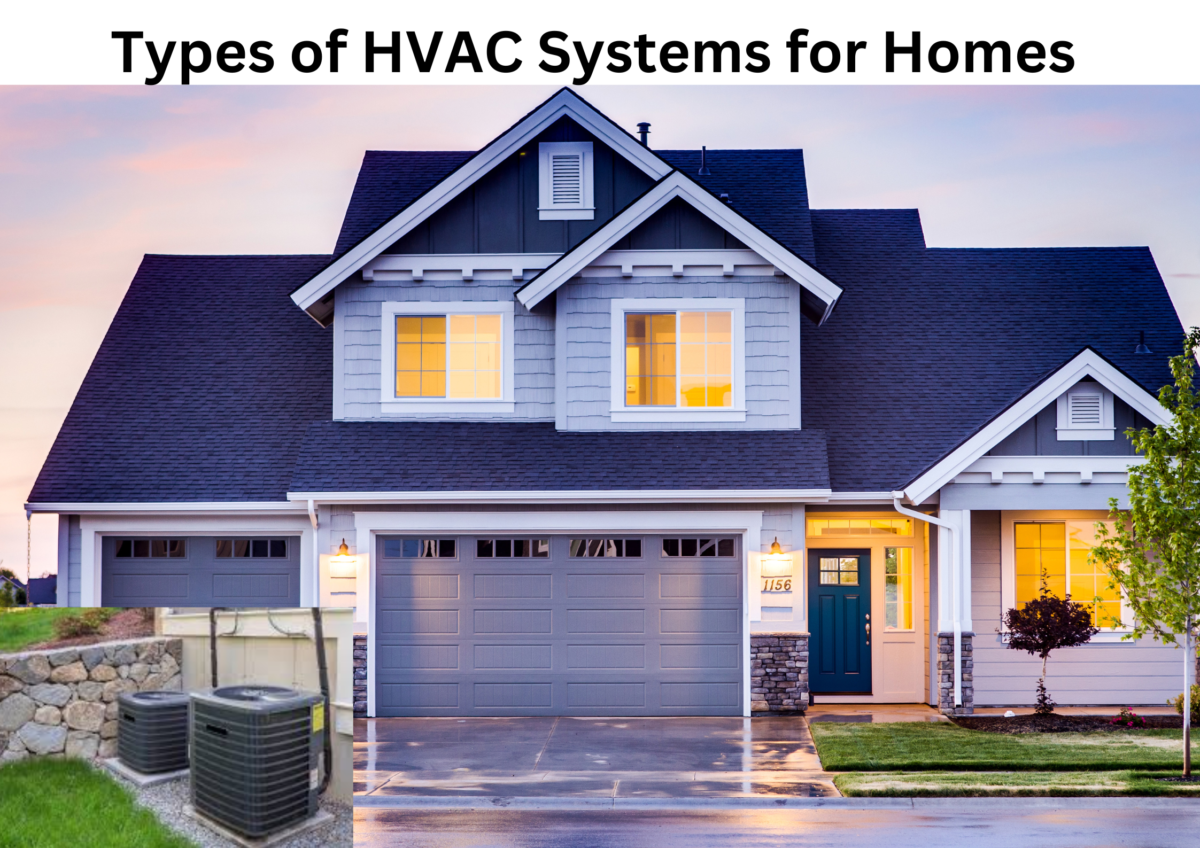If you are in search of the best HVAC system for your new home or, you want to upgrade your current HVAC system, then you must be confused about selecting the right one for your home.
These systems are highly expensive and a perfect HVAC system makes a huge difference in your home. As various types of residential HVAC systems are available in the market, you must learn about the various types of residential HVAC systems, their working principles, and pros and cons before purchasing the suitable one for your home.
To make your purchasing process easier, this article clearly explains the 6types of HVAC systems for homes. Read the full article and get a clear knowledge about it.
What is an HVAC System?
HVAC refers to heating, ventilation, and air conditioning. An HVAC system is an all-inclusive home comfort system that is utilized for heating and cooling a closed space according to the user’s requirements. It is also used to improve indoor air quality through mechanical ventilation and filtration.
The central air conditioner split system, central heat pump split system, ductless mini split system, packaged HVAC system, etc. are the basic types of HVAC systems used for residential purposes.
There are various types of HVAC systems available in the market. The types are different but the basic working principle is they take in the indoor air, process it, and, circulate the conditioned air throughout the building’s ductwork and inside the indoor space.
The main objective of a residential HVAC system is to keep the home spaces comfortable and convenient throughout the year.
Types of HVAC Systems for Homes
Central Air Conditioner Split System
A central air conditioner split system is utilized to supply cool air throughout the home. These are the most popular HVAC systems used by many residential homes.
It is a split system means the whole HVAC system is split between an indoor cabinet and an outdoor cabinet. Again, both of these indoor and outdoor components are connected via wires and refrigerant lines.
Working Principle:
The basic working principle of a central air conditioner split system is to remove heat from the air.
- The indoor cabinet works as an air handler and contains evaporator coils and a blower. The outdoor cabinet contains a condenser coil and compressor.
- A fan that is placed inside the indoor cabinet draws in the warm air from the room and blows it over the cold evaporator coils.
- The refrigerant inside the evaporator coils works as heat transfer fluid. It absorbs heat from the air and makes it cool. The cooled air is then circulated back inside the room.
- The heat trapped inside the refrigerant moves to the outdoor cabinet. The compressor present in the outdoor cabinet increases the pressure of the refrigerant and makes it hotter than the outdoor temperature. Thus, the heat in the refrigerant is absorbed by the outdoor air.
- When the refrigerant turns into vapor, the compressor pushes it into the condenser coils.
- The fan located in the outdoor compartment blows air across hot condenser coils and the refrigerant releases the heat and it becomes cold again.
- This process continues until the room temperature reaches the desired point set on the thermostat by the user.
Pros of Central Air Conditioner Split System
- The smart thermostat present inside the system learns about the preferences of users and cools the room accordingly. This makes your home comfortable to live and also saves energy.
- The operating process of the central air conditioner split system is very quiet.
- This system is usually placed outside the home usually in the utility room, which gives a decent look to the home.
- This system helps in improving the indoor air quality of your home.
Cons of Central Air Conditioner Split System
- It has limited flexibility in regulating the temperature of individual rooms.
- The system consumes more energy and thus increases the electricity bill of your home.
- The installation and maintenance costs are usually higher.
Central Heat Pump Split System
A central heat pump split system is almost similar but, more versatile than a central air conditioner split system. The difference between both systems is the central air conditioner split system circulates cooled air inside the room whereas, the central heat pump split system not only supplies the heat out of the room but also brings the heat back inside the room. It functions in both ways.
Working Principle of Central Heat Pump Split System
- This system contains a condenser which is also configured as a heat pump placed outside the home and an air handler or, evaporator coil is located inside the home.
- It contains a reversing valve that reverses the flow of refrigerant and moves the heat from outside to inside.
- The indoor air handler programmed by the thermostats maintains the desired temperature inside the home.
Pros of Central Heat Pump Split System
- As this system comes with dual functionality it is more energy efficient and saves a lot of electricity bill.
- These systems are robust and durable.
Cons of Central Heat Pump Split System
- Some models have a limited temperature range compared to other HVAC systems.
- In areas where the electricity rates are higher, increases the operation cost of this type of HVAC system.

Ductless Mini Split System
If you have a small home without any ductwork present inside it and you want to make it cool or, hot you should consider buying a ductless mini split system. This type of HVAC system maintains the desired temperature of individual rooms without the presence of any ducts.
The ducts are used to transfer conditioned air from the furnace or, air cooler to several vents. A ductless mini-split system does not have any ductwork rather it uses individual wall-mounted blowers to provide conditioned air inside the home.
Working Principle of ductless mini split system
- The ductless mini-split system consists of a compressor, a single condensing unit that is present outside the home, and individual wall-mounted blowers that are located inside the rooms.
- The individual indoor units are connected to the outdoor unit through refrigerant lines.
- The air handler traps the indoor air and passes it over the refrigerant lines. The refrigerants absorb heat from the air and make it cool. The cooled air is then circulated back inside the room.
- The compressor increases the pressure of the refrigerants and makes it hotter than the outdoor air. The outdoor air absorbs the heat from the refrigerant. When the refrigerant turns into vapor, the compressor pushes it into the condenser coils.
- The fan located in the outdoor compartment blows air across hot condenser coils and the refrigerant releases the heat and it becomes cold again.
- This cycle continues and the heat transfers from indoors to outdoors to keep the temperature of indoor air at an ideal level.
Pros of ductless mini split system
- The installation process of a ductless mini-split system is easier than the other types of HVAC systems.
- This system is highly energy efficient because you can regulate the temperature of individual rooms and you can switch on the unit according to your requirements.
- These systems produce less noise during operation.
- It provides better air quality.
Cons of ductless mini split system
- Its performance degrades in extreme temperatures.
- The installation and maintenance costs are higher.
- The ductless mini split systems are expensive.

Packaged HVAC System
Packaged HVAC systems are the simplest types of HVAC systems. They contain both the outdoor and indoor components in a single cabinet or a package. This package consists of all the heating and cooling components.
Working Principle of packaged HVAC system
- The packaged unit which contains both the heating and cooling equipment is placed outside the home or on the roof.
- The necessary ductwork is connected to the packaged unit.
- The wirings and gas lines are connected.
- Thus, the packaged HVAC system is ready to provide conditioned air inside the home to make it livelier and more comfortable.
Pros of packaged HVAC system
- The convenience is the most important advantage of the packaged HVAC system.
- These systems are space savers and can be placed outside or, on the rooftop.
- As all the heating and cooling equipment are located in one place the maintenance is easy.
- This system facilitates with you a quieter home. You will not be disturbed by any indoor noises.
Cons of packaged HVAC system
- As the system is located outdoors, harsh weather conditions can damage it.
Smart HVAC System
A smart HVAC system is integrated with networked devices, the Internet of Things (IoT), and sensors, so that the user can regulate the indoor temperature without being physically present in that space. The user can control temperature, fan speed, humidity level, and air quality by using a mobile app.
Working Principle of Smart HVAC System
A smart HVAC system contains one thermostat, one sensor, and one smart vent in each room. As all of this equipment is connected via Internet connectivity, you can communicate with the system to regulate the temperature.
The smart sensors present inside the system sense and detect the presence of any human being inside the home. Based on the demand and occupancy inside the home the temperature will automatically be regulated.
If are present outside your home, you can still regulate the temperature of your home remotely with the help of smartphone apps. You can also set the timers of your HVAC system according to your timings so that they will be automatically turned on or, off at the pre-defined time.
Pros of Smart HVAC System
- You can regulate your home’s comfort level remotely by using smartphone apps.
- The sensors inside the smart HVAC system can detect the presence of people inside the home and allow it to adjust automatically.
- These systems are highly energy efficient and save more on your electricity bills.
Cons of Smart HVAC System
- Smart HVAC systems are very expensive. They cost almost four to five times more than a traditional HVAC system.
Mobile Home Heating and Cooling System
Mobile homes are usually not as well-insulated as the traditional homes. Mobile home heating and cooling systems are designed to heat and cool air in the mobile homes. Window, portable, ductless mini-split systems are usually considered mobile home heating and cooling systems.
Working Principle of Mobile Home Heating and Cooling System
The mobile home heating and cooling system includes an air conditioning system, furnace, ductwork, and vents. The furnace uses natural gas, propane, or, electricity to generate heat. The heat is then distributed throughout the home through ductwork and vents.
The air conditioning system draws in the warm indoor air and passes it over refrigerants. The refrigerant absorbs the heat and supplies the cooled air inside the home. It uses the compressor and condenser coils to expel the heat outside the home.
The ductwork and vents circulate the conditioned air inside the home.
What Are the Factors to Consider While Purchasing the Best HVAC System for Your Home?
Home Comfort:
While purchasing an HVAC system for your home, first think about your personal comfort preferences. Various types of HVAC systems are available in the market standard furnace and air conditioner systems, ductless mini split systems, geothermal HVAC systems, etc. So, select the one which is best suited for your home.
Size of HVAC System:
A perfect HVAC system should be selected according to the layout and size of your home. An undersized HVAC system cannot provide a comfortable temperature whereas, an oversized system will decrease the efficiency and increase wear and turn.
Capacity of HVAC System:
The capacity of an HVAC system required to maintain the desired temperature is measured by the BTU (British Thermal Unit) load. The BTU loads depend on factors like square footage, insulation, number of windows, and ceiling height of the home. So, first, measure the BTU load to select the suitable HVAC system for your home.
Energy Efficiency Ratings:
The energy efficiency rating provided by the manufacturer which is written on the system cover is an important factor to consider when buying an HVAC system. The higher the energy efficiency value the lower the power consumption by the HVAC system and thus the lower the electricity bills.
Budget:
As various types of HVAC systems are available in the market, select the one that fits your budget and also saves a lot of electricity bills in the future. Efficient HVAC systems are often expensive. Their initial cost is higher but in the long run, they offer significant energy savings and save a lot of electricity bills.
Conclusion
In this article, various types of HVAC systems for homes such as central air conditioner split systems, central heat pump split systems, ductless mini split systems, smart HVAC systems, mobile home heating and cooling systems, and packaged HVAC systems are explained in detail. It also explains some major factors that must be considered while purchasing the best HVAC system for homes.
FAQS
- What is the most common HVAC system used in residential buildings?
Standard heating and cooling split systems are the most common HVAC systems used in residential buildings.
- What is the largest residential HVAC system?
5 tons is considered the largest residential HVAC system.
Also Read
- How Does a Refrigerator Work? A Step-by-Step Guide 2024
- 8 Reasons Why Refrigerator Not Cooling and Solutions
- Side By Side Vs French Door Refrigerator 2024
- Counter Depth Refrigerator vs. Standard Refrigerator: Which One Is Better?
- Where Should I Place My Air Purifier? 2024
- How Do You Know If You Need an Air Purifier? 2024
- HEPA Air Purifier: Definition, Types, Uses, Efficiency, Working Principle
- Whole House Air Purifier: Types, Pros, Cons, Working Principle 2024
- Air Purifier Advantages and Disadvantages
- How Do Air Purifiers Help? 6 Benefits
- Whole House Dehumidifier: Types, Working Principle, Pros, Cons 2024
- How Does a Commercial Dehumidifier Work? 2024
- How Does a Dehumidifier Work? Types, Uses, Benefits 2024
- 10 Tips for Buying a Dehumidifier
- Dehumidifier Vs Air Purifier 2024
- Dehumidifier vs. Air Conditioner 2024
- Cool Mist Humidifier: Types, Uses, Benefits, Working Principle 2024
- Do Humidifiers Help with Air Quality? 2024
- When Do You Need a Humidifier? 8 Common Signs
- How Do Humidifiers Work? A Complete Guide 2024
- How Humidifier Helps Breathing? 2024
- Humidifier Vs Dehumidifier Vs Air Purifier: Which One Should You Buy? 2024


8 thoughts on “Explore 6 Types of HVAC Systems for Homes in 2025”